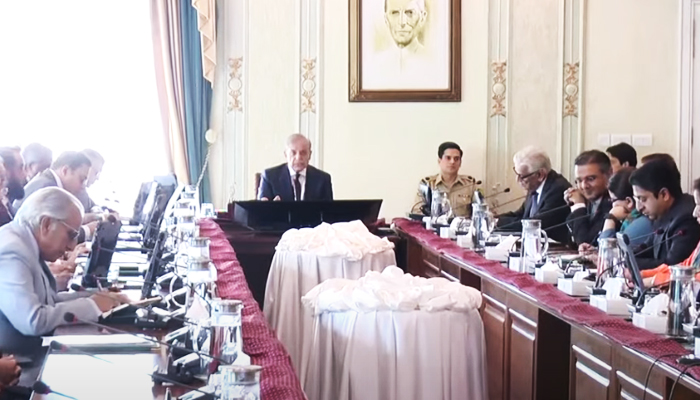People to get 'quick justice' after new law: PM
"With 26th Constitutional Amendment, people will get quick justice from judicial system," says premier
Prime Minister Shehbaz Sharif on Tuesday said the 26th Constitutional Amendment would bring ease for the common man who had to suffer owing to inordinate delays in seeking justice.
"With the 26th Constitutional Amendment, the people will get quick justice from the judicial system," he said, addressing a meeting of the federal cabinet whom he congratulated on the development.
He added that the establishment of constitutional benches would offer convenience to the common man.
The reforms, the premier insisted, would prove to be a milestone for the country’s political and economic stability as well as public welfare.
The prime minister's remarks came after the ruling coalition succeeded in pushing the highly contentious judicial reforms through the parliament via a two-third majority with 225 and 65 votes in the lower and upper house, respectively.
Under the judicial reforms — opposed by the Pakistan Tehreek-e-Insaf (PTI) which boycotted the voting process — the chief justice of Pakistan will now be selected by a parliamentary committee and have a fixed term of three years. A new constitutional bench will also be formed under the constitutional package.
Following the late-night marathon session in the parliament which began on Sunday evening and ended in the early morning hours on Monday, PM Shehbaz sent an advice to President Zardari to give his assent and sign the legislation into law.
After the president's assent, the Constitutional Amendment Bill 2024 has now become an Act of the parliament which be followed by the formation of a special parliamentary committee — responsible for the appointment of the new CJP under clause 3 of Article 175A of the Constitution.
Incumbent CJP Qazi Faez Isa, who is set to retire on October 25, will send the names of three senior judges to the committee under sub-clause 3 of Article 175A.
The committee will appoint the next CJP and will send the name to the PM who will then forward it to the president.
He maintained that the new legislation was passed following an in-depth consultation among the ruling coalition and opposition parties, terming it an accomplishment of the vision of the Charter of Democracy signed by then-Pakistan Peoples Party (PPP) chairperson Benazir Bhutto and Pakistan Muslim League-Nawaz chief Nawaz Sharif on May 14, 2006
He said the tireless efforts led to the successful legislation which also manifested a true spirit of consultation.
Prime Minister Shehbaz thanked the leadership of the supportive political parties including President Asif Zardari, PPP Chairman Bilawal Bhutto-Zardari, Jamiat Ulema-e-Islam-Fazl (JUI-F) chief Mualana Fazlur Rehman, Muttahida Qaumi Movement-Pakistan, National Party, Awami National Party, Balochistan Awami Party and, also the independent candidates for their vote.
Highlights of the bill
- Chief Justice of Pakistan's (CJP) tenure fixed at three years.
- Constitutional benches to be established at the SC and high courts.
- Senior-most judge of each bench to serve as presiding officer.
- Parliamentary committee to nominate new CJP from panel of three most senior judges.
- Committee to propose name to PM, who will then forward it to president for final approval.
- JCP, led by CJP and three others, responsible for appointment of SC judges.
- JCP to monitor judges’ performance, report any concerns to Supreme Judicial Council.
- Complete eradication of Riba (interest) from country by January 1, 2028.
-
Security forces gun down 30 terrorists in multiple IBOs in KP: ISPR
-
MQM-P calls for new province in Sindh
-
US report validates Pakistan military edge over India: PM
-
Banned TTP poses serious threat to Pakistan security: UNSC panel
-
CM Afridi clarifies remarks on by-poll after ECP requests army deployment
-
Dubai sees 3.2m Pakistani passengers in 2025 as airport sets new milestone
-
Security forces kill 23 Indian proxy terrorists in KP's Kurram
-
Pakistan to construct island to boost oil exploration: report












